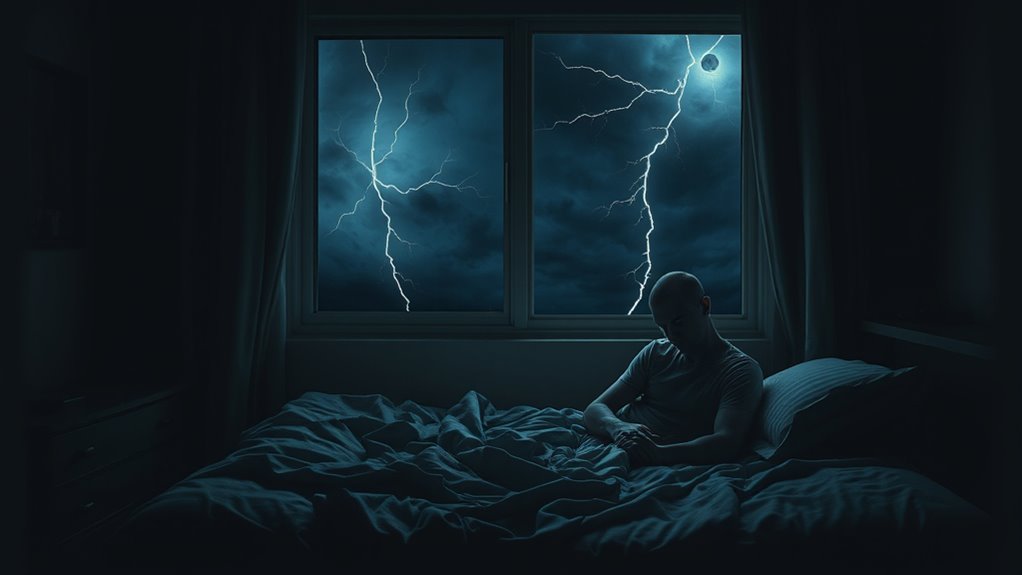Trauma dreams often replay unresolved feelings and memories during the early morning hours, especially around 3 a.m., when your brain is most actively processing emotions and subconscious fears. During REM sleep at this time, your mind works through difficult experiences, bringing hidden feelings to the surface. These dreams act as a way for your subconscious to communicate and help process emotions. If you keep exploring, you’ll discover more about how these dreams can support healing.
Key Takeaways
- Trauma dreams often occur during REM sleep, which peaks around 3 A.M., when emotional processing is most active.
- The subconscious replays unresolved feelings and memories during this time, bringing past trauma to conscious awareness.
- Nightmares at 3 A.M. serve as emotional signals, helping the brain process and confront trauma in a symbolic, safe space.
- The timing aligns with the body’s natural cycle for emotional release and integration of difficult experiences.
- Recognizing these dreams as part of healing can facilitate emotional work and reduce their frequency over time.

Have you ever woken up feeling shaken after a vivid, distressing dream? That jarring experience is more common than you might think, especially when it involves trauma. These intense dreams often leave you with a racing heart or a lingering sense of dread, and they tend to occur during the early hours of the morning. Understanding why these trauma dreams happen and what they mean can help you process your emotions and find some relief.
When you experience trauma dreams, you might notice recurring themes or symbols that seem strange or unsettling. These are what we call nightmare symbolism, and they serve a purpose in your mind’s way of communicating unresolved feelings. For example, drowning, being chased, or falling might pop up repeatedly, reflecting your subconscious fears or trauma-related memories. These symbols aren’t random; they’re part of your brain’s way of signaling that there’s emotional processing needed. Your brain is trying to make sense of difficult experiences by weaving them into your dreams, giving you a chance to confront unprocessed emotions in a safe, symbolic space.
The reason these dreams happen during the night, especially around 3 A.M., has a lot to do with your body’s natural sleep cycles and emotional regulation. During REM sleep, your brain is particularly active, and it’s when most vivid dreams occur. If you’re carrying unresolved trauma, your brain may use this time to replay and process these distressing memories. This intense emotional processing can stir up feelings of fear, sadness, or anger, which then manifest as nightmares. That’s why your subconscious might pick this moment to flood your mind with these vivid images, serving as a kind of emotional release or confrontation.
It’s helpful to see these dreams not just as random nightmares but as messages from your subconscious urging you to work through unresolved feelings. Recognizing the symbolism involved can give you insights into what aspects of your trauma need attention. Instead of dismissing these dreams as mere nightmares, think of them as part of your emotional processing. They’re your mind’s way of trying to heal by bringing buried feelings to the surface, albeit in a distressing form. The more you understand the symbolic language of your dreams, the better equipped you’ll be to address your emotional wounds and gradually lessen the frequency or intensity of these nighttime replayings.
Frequently Asked Questions
Can Trauma Dreams Predict Future Mental Health Issues?
Trauma dreams can sometimes hint at future mental health issues, especially if they involve intense dream symbolism or cause sleep disturbances. When you experience recurring trauma dreams, it might be a sign your subconscious is processing unresolved feelings. Paying attention to these dreams and how they affect your sleep helps you recognize potential mental health concerns early, encouraging you to seek support before problems escalate.
Are Trauma Dreams Different Across Cultures?
It’s interesting how trauma dreams differ across cultures, isn’t it? You might notice that cultural symbolism shapes what your dreams reveal, influencing how you interpret them. In some traditions, dreams hold special significance and are seen as messages, while others see them as reflections of subconscious fears. Your understanding of these dreams depends on your cultural background and dream interpretation practices, highlighting the rich diversity in how trauma manifests in sleep.
Do Trauma Dreams Improve With Therapy?
You might wonder if trauma dreams get better with therapy. The answer is yes; therapy often helps by improving sleep hygiene and offering better dream interpretation. As you process emotions and resolve past issues, these dreams can lessen in frequency and intensity. Consistently practicing good sleep habits and discussing your dreams with a therapist can support your healing journey, making restful sleep and fewer trauma-related nightmares more achievable.
Can Medication Reduce Trauma-Related Nightmares?
You might think medication alone can fully prevent trauma-related nightmares, but it’s often part of a broader treatment plan. Medication options like prazosin are specifically used for nightmare prevention, helping reduce their frequency and intensity. While not a cure-all, these medications can considerably lessen distress, enabling better sleep. Always consult a healthcare professional to tailor the right approach, combining medication with therapy for the best results.
How Long Do Trauma Dreams Typically Last?
Trauma dreams usually last about 10 to 20 minutes, but their vividness can make them feel longer. Your dream recall plays a role in remembering these episodes, and frequent nightmares may indicate unresolved trauma. If nightmares persist, it’s helpful to track their frequency and content, so you can discuss potential treatments with a professional. Managing stress and practicing good sleep habits also help reduce the duration and impact of trauma dreams.
Conclusion
As dawn approaches, your mind finally releases the storm—like the breaking of a dark cloud revealing a clear sky. Those trauma dreams, like shadows at your feet, fade with the morning light. Remember, each night’s darkness holds the promise of dawn. With patience and healing, you’ll find that the shadows no longer cling, and the past’s stormy echoes become distant whispers, giving way to clarity and peace, just beyond the horizon.










